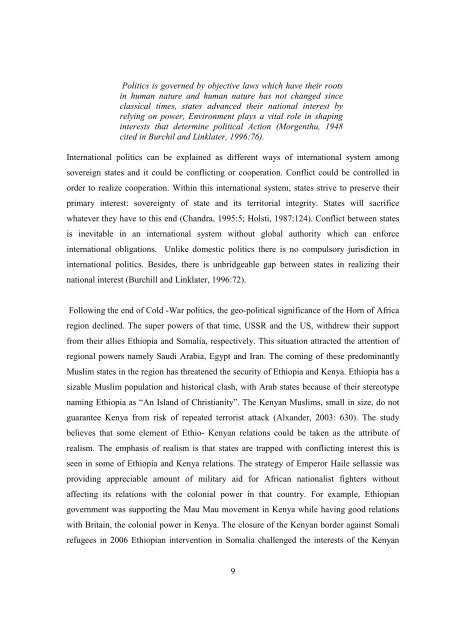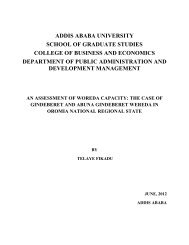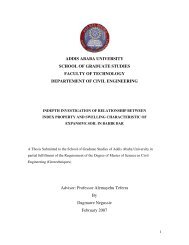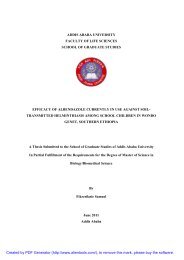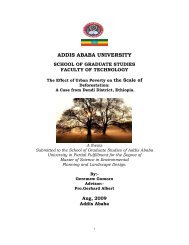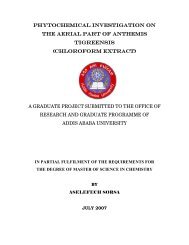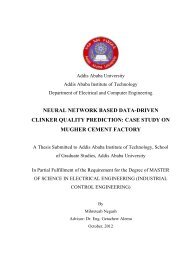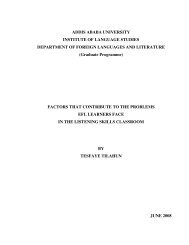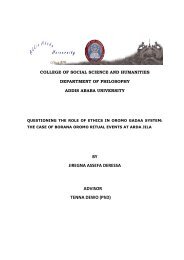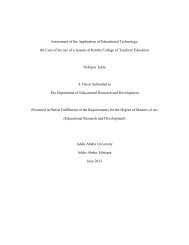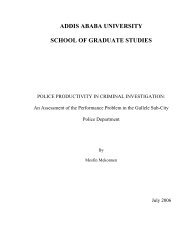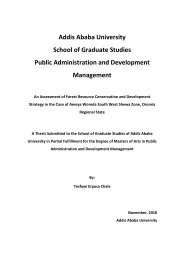HENOK MERHATSIDK 1.pdf - Addis Ababa University
HENOK MERHATSIDK 1.pdf - Addis Ababa University
HENOK MERHATSIDK 1.pdf - Addis Ababa University
You also want an ePaper? Increase the reach of your titles
YUMPU automatically turns print PDFs into web optimized ePapers that Google loves.
Politics is governed by objective laws which have their roots<br />
in human nature and human nature has not changed since<br />
classical times, states advanced their national interest by<br />
relying on power, Environment plays a vital role in shaping<br />
interests that determine political Action (Morgenthu, 1948<br />
cited in Burchil and Linklater, 1996:76).<br />
International politics can be explained as different ways of international system among<br />
sovereign states and it could be conflicting or cooperation. Conflict could be controlled in<br />
order to realize cooperation. Within this international system, states strive to preserve their<br />
primary interest: sovereignty of state and its territorial integrity. States will sacrifice<br />
whatever they have to this end (Chandra, 1995:5; Holsti, 1987:124). Conflict between states<br />
is inevitable in an international system without global authority which can enforce<br />
international obligations. Unlike domestic politics there is no compulsory jurisdiction in<br />
international politics. Besides, there is unbridgeable gap between states in realizing their<br />
national interest (Burchill and Linklater, 1996:72).<br />
Following the end of Cold -War politics, the geo-political significance of the Horn of Africa<br />
region declined. The super powers of that time, USSR and the US, withdrew their support<br />
from their allies Ethiopia and Somalia, respectively. This situation attracted the attention of<br />
regional powers namely Saudi Arabia, Egypt and Iran. The coming of these predominantly<br />
Muslim states in the region has threatened the security of Ethiopia and Kenya. Ethiopia has a<br />
sizable Muslim population and historical clash, with Arab states because of their stereotype<br />
naming Ethiopia as “An Island of Christianity”. The Kenyan Muslims, small in size, do not<br />
guarantee Kenya from risk of repeated terrorist attack (Alxander, 2003: 630). The study<br />
believes that some element of Ethio- Kenyan relations could be taken as the attribute of<br />
realism. The emphasis of realism is that states are trapped with conflicting interest this is<br />
seen in some of Ethiopia and Kenya relations. The strategy of Emperor Haile sellassie was<br />
providing appreciable amount of military aid for African nationalist fighters without<br />
affecting its relations with the colonial power in that country. For example, Ethiopian<br />
government was supporting the Mau Mau movement in Kenya while having good relations<br />
with Britain, the colonial power in Kenya. The closure of the Kenyan border against Somali<br />
refugees in 2006 Ethiopian intervention in Somalia challenged the interests of the Kenyan<br />
9


